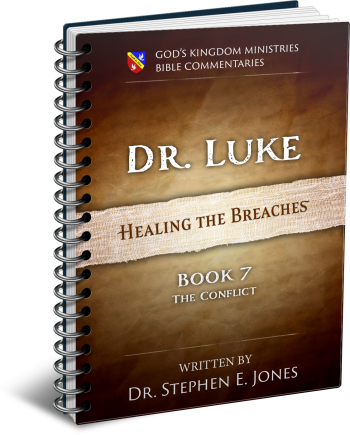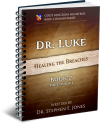Latest Posts
View the latest posts in an easy-to-read list format, with filtering options.

This is a commentary on Luke 18:31 to 21:38 Describing Jesus's trip to Jerusalem and the conflict with the Chief Priest leading to His Crucifixion.
Category - Bible Commentaries

After the disciples found the donkey and its daughter, Luke 19:35-37 says,
35 And they brought it to Jesus, and they threw their garments on the colt, and put Jesus on it. 36 And as He was going, they were spreading their garments in the road. 37 And as He was now approaching, near the descent of the Mount of Olives, the whole multitude of the disciples began to praise God joyfully with a loud voice for all the miracles which they had seen…
Because Matt. 21:2 speaks of “a donkey tied there and a colt with her,” we know that there were two donkeys involved. Jesus instructed the disciples to “untie THEM and bring THEM to Me.” Both were tied; both were then untied. Both were brought to Jesus. Matt. 21:6, 7 says,
6 And the disciples went and did just as Jesus had directed them, 7 and brought the donkey and the colt, and laid on THEM their garments, on which He sat.
Garments were placed on both donkeys, both mother and colt, and Matthew gives the impression that Jesus sat on both of them. But Zech. 9:9 prophesies that the Messiah comes “on a colt, the foal of a donkey,” indicating that He was to sit on the colt to fulfill this word. Luke, of course, does not discuss more than one donkey but says, “they threw their garments on the colt and put Jesus on it.”
It seems likely, then, that both donkeys were present as Jesus rode over the Mount of Olives into Jerusalem. However, to fulfill the prophecy He had to ride specifically on the colt, rather than the jenny. The colt was young, but fully grown, and it is likely that they were about the same height. It may be that they walked close together, bound by the garments that were spread upon them both. Perhaps Jesus then sat upon both of them on a cushion made of multiple garments.
Because of the miracles done in Jericho and in Bethany, the expectations of this multitude were that Jesus would ride in triumph into Jerusalem and be crowned as the Messiah-King. Even if the religious did not like Jesus, the multitude of disciples would force their hand. Perhaps the twelve knew differently, having been forewarned on a number of occasions that Jesus was soon to die. But in the excitement of seeing the City of David as they rounded the curve in the road to descend through the East Gate, it is likely that all negative thoughts were swallowed up by the glory of the moment. They joined fully with the multitude, including Bar-Timaeus, who had followed Jesus (Luke 18:43), in proclaiming Him to be the King.
Some in the crowd cut down branches from trees and spread them in the road (Matt. 21:8; Mark 11:8), a detail which Luke omitted. As I showed earlier, Luke omitted many details, including the raising of Lazarus in Bethany. Luke quickly moves us into the theater of action on that Sunday, when it seemed as if all Kingdom prophecies were about to be fulfilled. It was a day of rejoicing, as Zech. 9:9 said.
During all of the feasts (18 days in all), the Hallel psalms (Ps. 113-118) were recited as a responsive reading. Psalm 113 began this way:
Levites: Hallelu Yah (“Praise the Lord”)
People: Hallelu Yah.
Levites: Hallelu, O servants of Yahweh.
People: Hallelu Yah.
These commemorated Israel’s deliverance from Egypt, and so they were particularly applicable at the feast of Passover, as seen directly in Psalm 114:1,
Levites: When Israel went forth from Egypt
People: When Israel went forth from Egypt
Levites: The house of Jacob from a people of strange language
People: Hallelu Yah.
They continued along this pattern, and as they neared the end of the Hallels, it reads in Psalm 118:25, 26,
25 O Lord, do save, we beseech Thee, do send prosperity! 26 Blessed is the one who comes in the name of the Lord; we have blessed you from the house of God.
The multitude shouted these verses as Jesus rode into Jerusalem. Luke 19:38 says,
38 saying, “Blessed is the King who comes in the name of the Lord; peace in heaven and glory in the highest!”
Matt. 21:9 says,
9 … Hosanna [“do save”] to the Son of David; Blessed is He who comes in the name of the Lord; Hosanna in the highest!”
Mark 11:9, 10 says,
9 “Hosanna! Blessed is He who comes in the name of the Lord; 10 Blessed is the coming kingdom of our father David; Hosanna in the highest!”
These shouts from the crowd show their expectation that the Messiah would deliver them from Rome, even as Moses had delivered them from Egypt. Mark 11:10 shows also that they expected the kingdom of David to emerge with the coming of the Messiah. No doubt the crowd thought that Jesus would do all of this at that time.
But Luke had been careful to record Jesus’ earlier teaching that contradicted the imminence of the Kingdom. In Luke 17:20, when the Pharisees questioned Him “as to when the kingdom of God was coming,” Jesus gave an obscure answer to the Pharisees but later explained to the disciples that “first He must suffer many things and be rejected by this generation” (Luke 17:25).
As Jesus rode into Jerusalem, some Pharisees in the crowd were offended by the praise of the people. Luke 19:39, 40 says,
39 And some of the Pharisees in the multitude said to Him, “Teacher, rebuke Your disciples.” 40 And He answered and said, “I tell you, if these become silent, the stones will cry out!”
Because the prophecy of Zechariah had to be fulfilled, either the crowd or the stones themselves were bound to cry out in witness to these events.
Both Matthew and Luke omit details that only Mark gives us. If we read only Matthew and Luke, we would think that Jesus cast out the bankers from the temple on His first entry into the city. But this did not happen, for it was already late in the day, and it is likely that the afternoon sacrifice had been offered, and the money changers had gone home. Jesus did not cast out the bankers and overthrow their tables until the following day (Monday). Mark 11:11-13 says,
11 And He entered Jerusalem and came into the temple; and after looking all around, He departed for Bethany with the twelve, since it was already late. 12 And on the next day, when they had departed from Bethany, He became hungry. 13 And seeing at a distance a fig tree in leaf…
Mark then tells us that after cursing the barren fig tree, Jesus cast out the money changers in the temple. The other gospel writers condense their accounts, seemingly unconcerned about establishing a precise chronology of events during the week. Yet when we study the gospels together, we may construct a more complete story to see how prophecy was fulfilled.
Luke 19:41-44 continues,
41 And when He approached, He saw the city and wept over it, 42 saying, “If you had known in this day, even you, the things which make for peace! But now they have been hidden from your eyes. 43 For the days shall come upon you when your enemies will throw up a bank before you, and surround you, and hem you in on every side, 44 and will level you to the ground and your children within you, and they will not leave in you one stone upon another, because you did not recognize the time of your visitation.”
Which day did Jesus lament over Jerusalem? We cannot say for sure, but it seems unlikely that He spoke these words of divine judgment on His first entry (Sunday). It is more likely that He did so immediately after cursing the fig tree on Monday morning. This was, in fact, the day that the verdict from the divine court would be decreed upon Jerusalem. Luke tells us in the next verses that He went into the temple and cast out the money changers, for we read in Luke 19:45, 46,
45 And He entered the temple and began to cast out those who were selling, 46 saying to them, “It is written, ‘And My house shall be a house of prayer,’ but you have made it a robbers’ den.”
Some time later, probably on a different day, Jesus found it necessary to reinforce this truth in the minds of the disciples. It seems that while Jesus and the disciples were departing from the city, walking up the Mount of Olives, they looked back on the beauty and majesty of the temple and expressed their admiration for it, forgetting that all of this would be devastated in a few decades.
Matt. 24:1, 2 shows its context to be in a quieter time.
1 And Jesus came out from the temple and was going away when His disciples came up to point out the temple buildings to Him. 2 And He answered and said to them, “Do you not see all these things? Truly I say to you, not one stone here shall be left upon another, which will not be torn down.”
Here we read nothing of Jesus weeping wept over the city, as He had done earlier when speaking of Jerusalem’s destruction. This was just a reminder of what He had told them earlier while on the way to the temple, where He would cast out the bankers.
On the other hand, Matthew places this statement in chapter 24, rather than in chapter 21, separating this prophecy from the cursed fig tree and the cleansing of the temple. Hence, while both passages speak about the same topic, they should not be considered to be part of the same conversation.
It was therefore on Monday that Jesus cursed the fig tree on His way to Jerusalem. When He arrived, He cast out the money changers and pronounced the divine sentence on Jerusalem, quoting Jeremiah 7:11. The temple had become a robbers’ den, a safe haven against the law of God. The time of their visitation (the investigation begun by John the Baptist) had come to a close, and the verdict was decreed against Jerusalem.